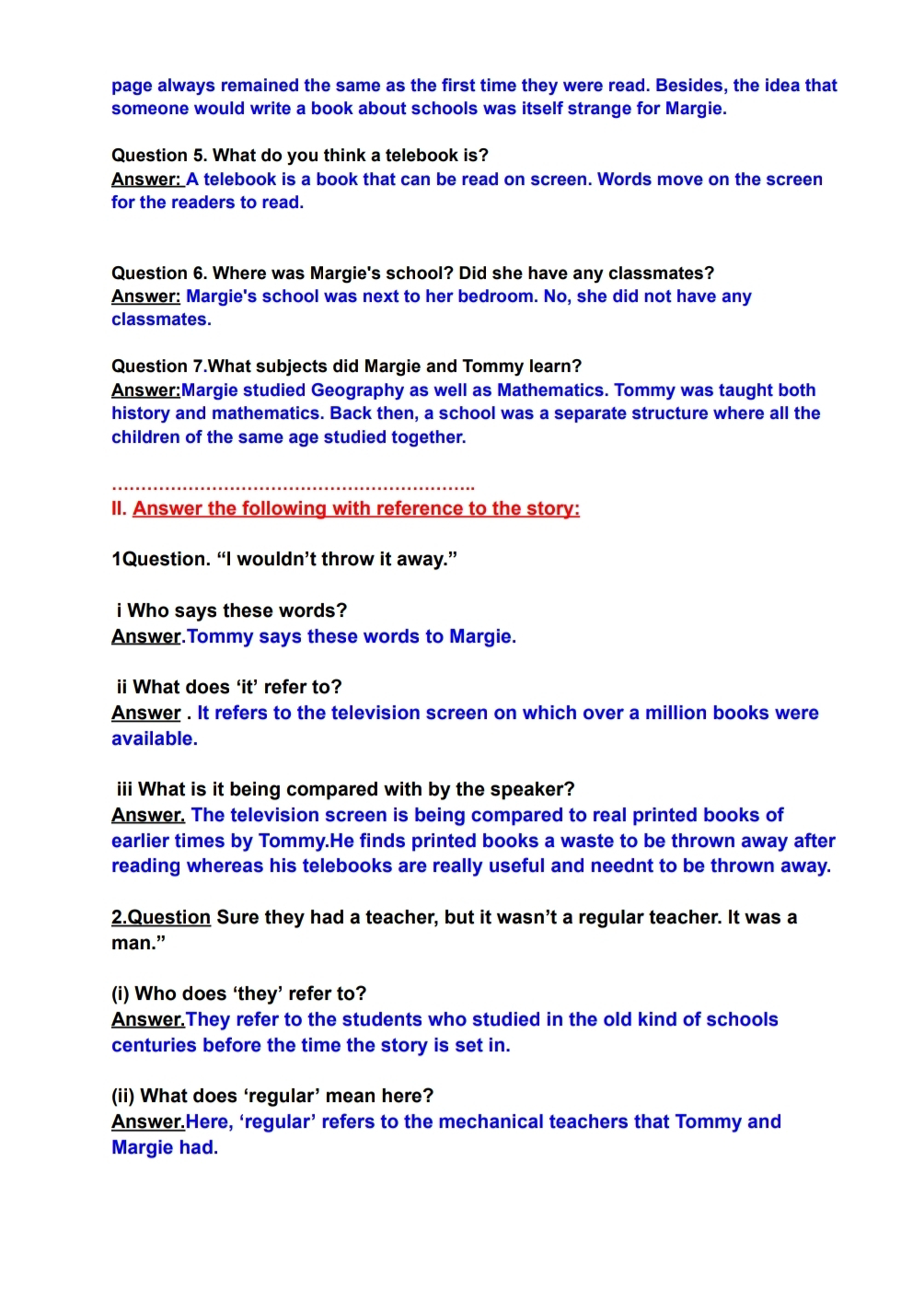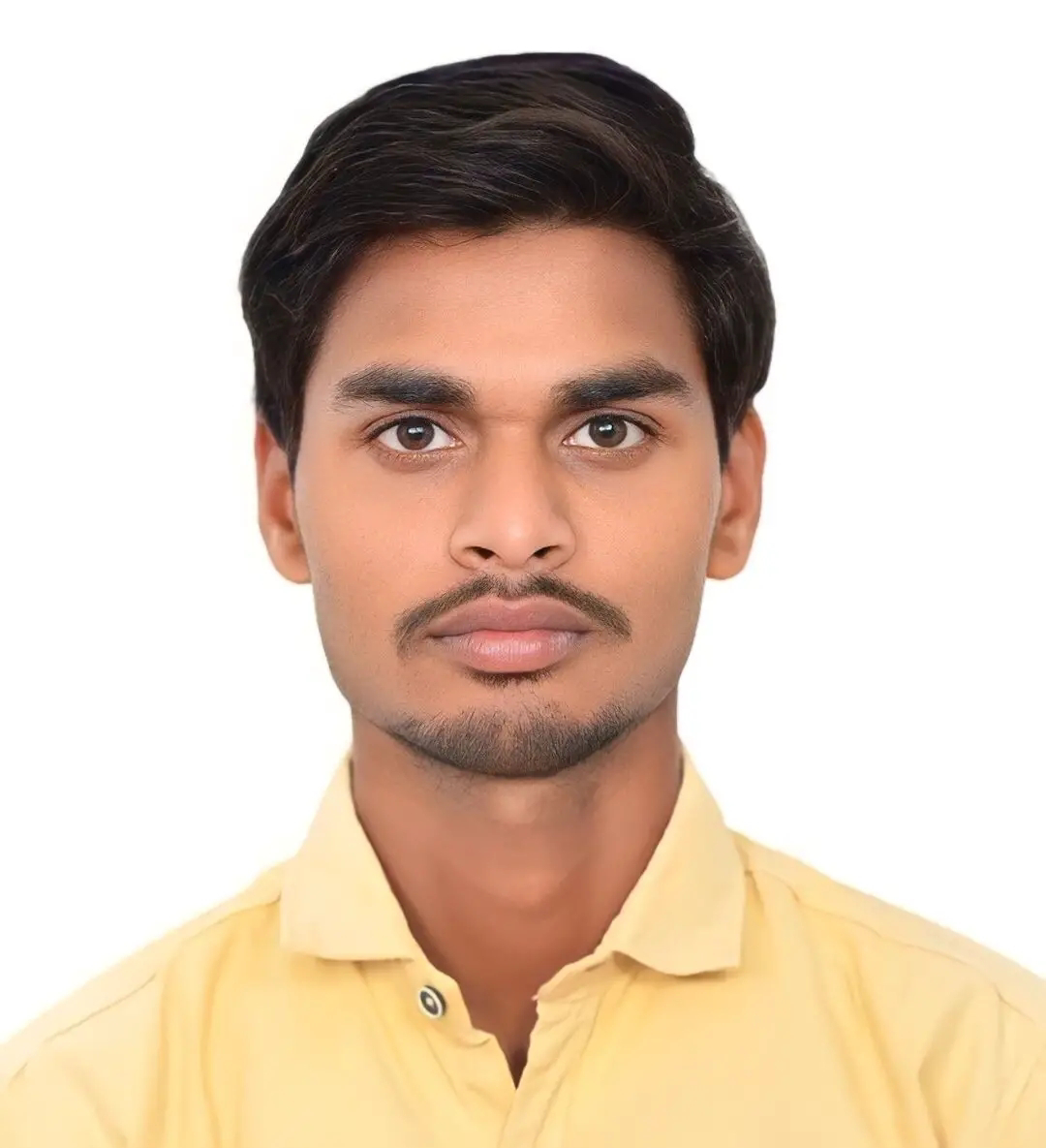Shree Ashraf Ali Noori Islamia school
Rarua
Class:9th
By Shakiluddin Ansari
Beehive
……………………………………………………..
1.Chapter -The Fun They had
(Isaac Asimov)
NCERT Exercise
1. Answer these questions in a few words or a couple of sentences each:
Question 1. How old are Margie and Tommy?
Answer: Margie is eleven and Tommy is thirteen years old.
Question 2. What did Margie write in her diary ?
Answer: On the page headed 17 May 2157, she wrote. "Today Tommy found a real book!”
Question 3. Had Margie ever seen a book before?
Answer: No, Margie had never seen a book before.
Question 4. What things about the book did she find strange?
Answer: Margie found it strange that the words printed on a book stood still instead of moving the way they did on a screen. She also found it odd that the words on a page always remained the same as the first time they were read. Besides, the idea that someone would write a book about schools was itself strange for Margie.
Question 5. What do you think a telebook is?
Answer: A telebook is a book that can be read on screen. Words move on the screen for the readers to read.
Question 6. Where was Margie's school? Did she have any classmates?
Answer: Margie's school was next to her bedroom. No, she did not have any classmates.
Question 7.What subjects did Margie and Tommy learn?
Answer:Margie studied Geography as well as Mathematics. Tommy was taught both history and mathematics. Back then, a school was a separate structure where all the children of the same age studied together.
……………………………………………………..
II. Answer the following with reference to the story:
1Question. “I wouldn’t throw it away.”
i Who says these words?
Answer.Tommy says these words to Margie.
ii What does ‘it’ refer to?
Answer . It refers to the television screen on which over a million books were available.
iii What is it being compared with by the speaker?
Answer. The television screen is being compared to real printed books of earlier times by Tommy.He finds printed books a waste to be thrown away after reading whereas his telebooks are really useful and neednt to be thrown away.
2.Question Sure they had a teacher, but it wasn’t a regular teacher. It was a man.”
(i) Who does ‘they’ refer to?
Answer.They refer to the students who studied in the old kind of schools centuries before the time the story is set in.
(ii) What does ‘regular’ mean here?
Answer.Here, ‘regular’ refers to the mechanical teachers that Tommy and Margie had.
(iii) What is it contrasted with?
Answer.The mechanical teacher is contrasted with the teacher of the earlier times, who was a human being.
……………………………………………….
III. Answer each of these questions in a short paragraph (about 30 words):
1 Question. What kind of teachers did Margie and Tommy have?
Answer. Margie and Tommy had mechanical teachers. The mechanical teachers had big screens on which all the lessons were shown and questions were asked. The children were taught through computer and television screens. They did not have humans as teachers.
2 Question. Why did Margie's mother send for the County Inspector ?
Answer. Margie's mother sent for the County Inspector because the mechanical teacher was not functioning efficiently. It had been giving her test after test in geography and she had been doing worse and worse.
3 Question. What did he do?
Answer. The County Inspector smiled at Margie and gave her an apple. He took the mechanical teacher apart from her. Then he fixed the mechanical teacher. He told Margie’s mother that the geography sector of the mechanical teacher was geared a little too quick and that he has slowed it up to an average ten-year level.
4 Question. Why was Margie doing badly in geography? What did the County Inspector do to help her?
Answer. Margie was doing badly in geography because the questions that were displayed on the screen of the mechanical teacher were too quick for her age.
The County Inspector slowed its speed to an average ten-year level so that Margie would be able to perform satisfactorily.
5 Question. What had once happened to Tommy's teacher ?
Answer. Tommy’s teacher was taken away for nearly a month because the history sector had blanked out completely. So, Tommy had nothing to do during that period. He only relaxed and enjoyed
6 Question. Did Margie have regular days and hours for school? If so, why?
Answer. Yes, Margie had regular days and hours for school because her mother said little girls learned better if they learned at regular hours.
7 Question. How does Tommy describe the old kind of school?
Answer. Tommy says that the old schools were different. They had a special building and all the kids went there to study. They laughed and shouted in the schoolyard. They enjoyed time together and learned lessons together in a classroom.
8. How does he describe the old kind of teachers?
Answer. Earlier, the teachers were not mechanical teachers, they taught the children in a special building where all the children went to learn. They asked questions and gave them home work.
………………………………………………….
IV. Answer each of these questions in two or three paragraphs (100-150 words):
1 Question. What are the main features of the mechanical teachers and the schoolrooms that Margie and Tommy have in the story ?
Answer.Margie and Tommy have mechanical teachers. They need not go to school for getting a formal education. The mechanical teacher is placed in one of the rooms of the house and they can get the knowledge of various subjects individually from the mechanical teacher. They don't have such classrooms where students sit together. They study from the tele books. So they don't require books and exercise books. The examination system is very different. They do homework in a different way. Margie has to write them out in a punch code. She learnt it when she was six years old. So the system of their education is technologically advanced and not based on printed books.
2 Question. Why did Margie hate school? Why did she think the old kind of school must have been fun?
Answer. Margie hated her school because she had a mechanical teacher. It was in her house. She was supposed to sit in that room alone to complete her home task or assignments. The part Margie hated most was the slot where she had to put homework and test papers. She thought that the old schools must have been fun because the students used to sit together in the classroom. They enjoyed, laughed and shouted in the schoolyard. Children needed company to enhance their skills. If they are isolated, they get depressed and dejected.
3 Question. Do you agree with Margie that schools today are more fun than the school in the story? Give reasons for your answer.
Answer. There is no doubt that today's schools are more funny than the future school discussed in the story. This school has nothing but a mechanical teacher with no emotions and sentiments. It does not have the ability to understand the psychology of a child. Moreover, it guides a pupil according to its adjusted modes. But today's schools work for the overall development of a child. They learn the same thing. The teachers are real human beings. They learn how to adapt themselves to the new surroundings and cope with the strangers. The students sit and learn together. These activities don't give vent to the feelings of depression, alienation and segregation.
………………………………………………….
Question 1.
Find the sentences in the lesson which match adverbs given in the box below,
Answer: ↓
awfully→ … and it was awfully funny… (para 1)
sorrowfully→ … until her mother had shaken her head sorrowfully… (para 3)
completely→… the history sector had blanked out completely (para 5)
loftily He added loftily→… (para 6)
carefully→ … pronouncing the word carefully,… (para 6)
differently→ … each kid has to be taught differently, (para 8)
Question 2.Now use these adverbs to fill in the blanks in the sentences below
Answer ↓
1.carefully
2.loftily
3.differently
4.sorrowfully
5.completely
6.nonchalantly
7.awfully
8.quickly
Question 3. Make adverbs from these adjectives
Answer ↓
1.angry — angrily
2.happy — happily
3.merry — merrily
4.sleepy — sleepily
5.easy — easily
6.noisy — noisily
7.tidy — tidily
8.gloomy — gloomily
Question 1.
Complete the following conditional sentences. Use the correct form of the verb.
Answers:
1.If I don’t go to Anu’s party tonight, she will get annoyed.
2.If you don’t telephone the hotel to order food, you will miss your evening meal.
3.Unless you promise to write back, I shall keep requesting you.
4. If she does not play any games, she will become lethargic and unfit.
5.Unless that little bird flies away quickly, the cat will pounce on it.
Writing, page 10
Answer ↓
516, Sec. 15
Panipat
11 Oct, 20XX
M/s, Mindfame Private Ltd.
1632, Asaf Ali Road New Delhi
Sub: Request for the new volume of Isaac Asimov’s short stories.
Sir,
I just came to know that a new revised volume of Isaac Asimov’s short stories has just been released. I will be very grateful if you send one set of this volume as early as possible at my mailing address.
Yours faithfully,
Rahim Khan
🌿Complete work 🌿
Shakiluddin Ansari
https://docs.google.com/document/d/1t_ssF9iPGpQfg3Yiq6heI46FGTwjnjBG0GKLtbUoQEE/edit?usp=drivesdk



















